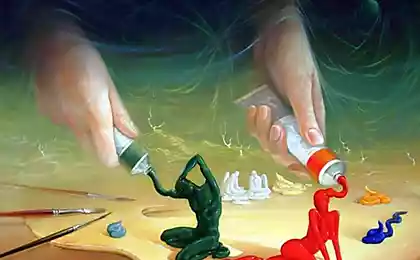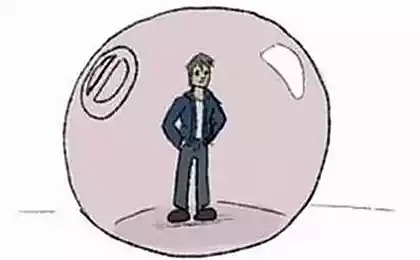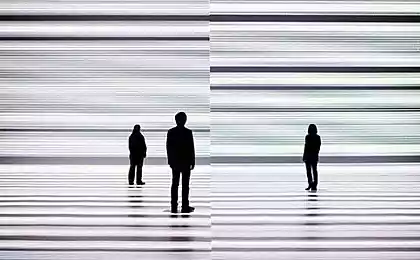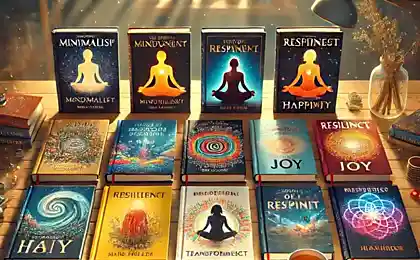576
Introverts see themselves more objectively than extroverts
The paradox druzhbyVy ever felt that your friends are more popular than you?
In fact, according to a new study, if you are sufficiently open-minded person, then most likely, you will encounter a "friendship paradox". Friendship paradox lies in the fact that you are likely to be friends with someone who has more friends than with people who have less friends.

Socialized people tend to have more friends. And it means that they are disproportionately represented in social networks, that is, in any social network more than extroverts than their percentage of the general population.
Research Tuck Business School at Dartmouth College takes this so-called paradox of friendship beyond pure mathematics.
The researchers recorded the appearance of social networks in developing a new class of students. Moreover, studies show that there is a shift of extraversion in real networks, and this effect is more pronounced among sociable people.

"If you're an extrovert, you really can have a distorted view of other people in general, - says researcher Daniel Feiler - if you are very closed, the view will be fairly accurate».
The researchers came to this conclusion by studying the interaction of two key factors in the formation of social networks.
They considered extraversion, which is associated with the popularity and Haemophilus influenzae in the light of the idea that people with similar levels of extraversion are more likely to become friends. The leading factor is Haemophilus influenzae. Since most friendly people in contact with other extroverts, their network on average more. Introverts, on the other hand, are more likely to form friendships with other introverts. In their networks it is still a "friendship paradox", but to a lesser extent.
The findings suggest that there is a bias, and many believe that they are more extroverted than it actually is, and introverts better socially aware than extroverts. "The findings of social norms based on the people with whom we interact. And if so, then we must assume that our social network - biased sample "- says Feiler.
The study was conducted in autumn 2012 in the new social networks for 284 students. Each student was surveyed twice, once in five weeks after the orientation, and again after 11 weeks.
Students are given a list of groups and asked to identify the people with whom they communicate. After the second survey, students completed Big Five Inventory - very detailed test designed to assess personality traits, including extraversion.
For the most part, these data showed that, as expected, - displacement of extraversion and there is more pronounced in networks extroverts. The degree of bias raised eyebrows: "skew gets really extreme," - says Feiler.
According to the researchers, the deep introverts make up only one percent of the population and is likely to have networks that are representative of the population as a whole.
The others look at our social world through the distorted lens - a sort of funhouse mirror that makes us feel less loved than our friends.
This, according to the study, gives the impression that other people are more socialized than it actually is.
"A lot of introverts are wondering:" I normal? - He says Feiler - and our research shows that you're probably more normal than you think ».
via www.dailymail.co.uk/sciencetech/article-3027929/Your-friends-probably-popular-especially-extrovert-claims-study.html
In fact, according to a new study, if you are sufficiently open-minded person, then most likely, you will encounter a "friendship paradox". Friendship paradox lies in the fact that you are likely to be friends with someone who has more friends than with people who have less friends.

Socialized people tend to have more friends. And it means that they are disproportionately represented in social networks, that is, in any social network more than extroverts than their percentage of the general population.
Research Tuck Business School at Dartmouth College takes this so-called paradox of friendship beyond pure mathematics.
The researchers recorded the appearance of social networks in developing a new class of students. Moreover, studies show that there is a shift of extraversion in real networks, and this effect is more pronounced among sociable people.

"If you're an extrovert, you really can have a distorted view of other people in general, - says researcher Daniel Feiler - if you are very closed, the view will be fairly accurate».
The researchers came to this conclusion by studying the interaction of two key factors in the formation of social networks.
They considered extraversion, which is associated with the popularity and Haemophilus influenzae in the light of the idea that people with similar levels of extraversion are more likely to become friends. The leading factor is Haemophilus influenzae. Since most friendly people in contact with other extroverts, their network on average more. Introverts, on the other hand, are more likely to form friendships with other introverts. In their networks it is still a "friendship paradox", but to a lesser extent.
The findings suggest that there is a bias, and many believe that they are more extroverted than it actually is, and introverts better socially aware than extroverts. "The findings of social norms based on the people with whom we interact. And if so, then we must assume that our social network - biased sample "- says Feiler.
The study was conducted in autumn 2012 in the new social networks for 284 students. Each student was surveyed twice, once in five weeks after the orientation, and again after 11 weeks.
Students are given a list of groups and asked to identify the people with whom they communicate. After the second survey, students completed Big Five Inventory - very detailed test designed to assess personality traits, including extraversion.
For the most part, these data showed that, as expected, - displacement of extraversion and there is more pronounced in networks extroverts. The degree of bias raised eyebrows: "skew gets really extreme," - says Feiler.
According to the researchers, the deep introverts make up only one percent of the population and is likely to have networks that are representative of the population as a whole.
The others look at our social world through the distorted lens - a sort of funhouse mirror that makes us feel less loved than our friends.
This, according to the study, gives the impression that other people are more socialized than it actually is.
"A lot of introverts are wondering:" I normal? - He says Feiler - and our research shows that you're probably more normal than you think ».
via www.dailymail.co.uk/sciencetech/article-3027929/Your-friends-probably-popular-especially-extrovert-claims-study.html























